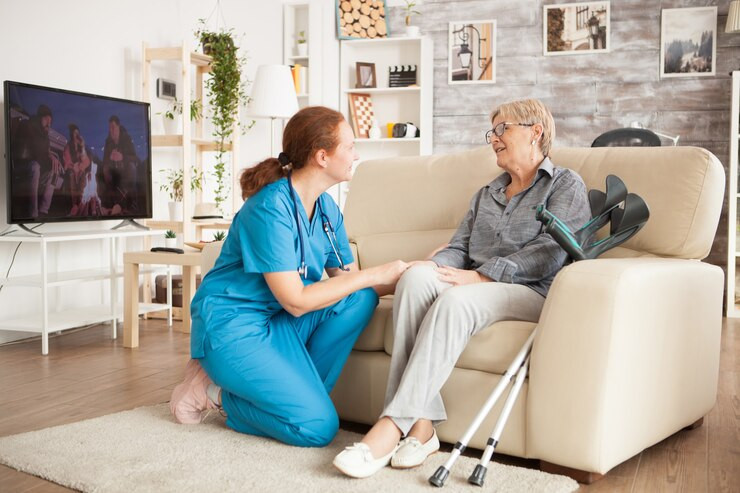views
Debunking The Most Common Myths About Senior Care in the USA
Debunking The Most Common Myths About Senior Care in the USA
As the U.S. population ages, the need for Richmond homecare services is more prominent than ever before. The reality is that many people are living longer, healthier lives than previous generations, and with that comes a host of opportunities and challenges when it comes to elder care. Unfortunately, there are numerous myths and misconceptions about senior care that can cloud people's judgment, resulting in unnecessary fear, confusion, or reluctance to seek help when needed.
In this blog post, we’ll explore and debunk the most common myths surrounding senior care in the U.S. so that families and caregivers can make informed decisions for their loved ones.
Myth #1: Senior Care Is Only for the "Oldest of the Old"
Reality: While many people associate senior care with advanced age, the need for care can arise much earlier. Age alone is not the determining factor for needing assistance. Many seniors in their 60s or 70s may require help due to chronic health conditions, mobility issues, or cognitive decline. In fact, the need for care often arises long before people hit their 80s or 90s, especially if they live with conditions like arthritis, diabetes, or heart disease.
Furthermore, the type of care someone needs can vary greatly. It might be as simple as help with daily tasks (such as housekeeping, meal preparation, or grocery shopping), or it might involve more intensive medical care, such as physical therapy or monitoring of medication. Senior care is a spectrum, and it should be personalized to meet the unique needs of the individual, no matter their age.
Myth #2: Senior Care Is Just for People With Serious Health Issues
Reality: Many people think that only those with significant health issues or disabilities need senior care. This is simply not true. In fact, one of the key benefits of senior care is the preventive services it provides. Regular assistance with health monitoring, personal care, and social engagement can prevent more serious conditions from developing and can help seniors maintain independence for a longer time.
For example, help with physical therapy exercises, meal planning, or managing medications can prevent falls, improve mobility, and ensure better overall health. Additionally, socialization and cognitive activities offered through senior care services can help prevent mental health issues like depression or cognitive decline associated with isolation.
Myth #3: Senior Care Is Too Expensive for the Average Family
Reality: It’s true that senior care can be costly, but the cost varies greatly depending on the type of care required. Many families assume that only nursing homes or full-time assisted living will be necessary, but in reality, there are numerous options to fit different budgets. These include home care services, adult day care, and respite care. Each of these options can be customized based on the level of care needed, which allows families to manage costs effectively.
Additionally, Medicare, Medicaid, and private insurance may cover some of the costs associated with senior care, depending on eligibility. Many seniors also choose long-term care insurance, which can help offset the financial burden of senior care services. It’s important to research all available financial assistance options and consider different care levels that might be more affordable than assumed.
Myth #4: Nursing Homes Are the Only Option for Senior Care
Reality: Nursing homes, also known as skilled nursing facilities, are often associated with senior care because they provide round-the-clock medical attention and assistance with daily activities. However, nursing homes are just one type of senior care facility, and they are generally reserved for those who require constant medical care or have severe physical or cognitive impairments.
Many seniors do not need this level of care, and there are alternative living arrangements that may better suit their needs. Assisted living facilities, for example, offer a more independent lifestyle, with staff available to assist with basic daily tasks such as bathing, dressing, and managing medications. For seniors who prefer to age in place, home care services are also available, where professional caregivers come to the home to assist with personal care, household chores, and transportation.
Other alternatives include memory care units, which provide specialized care for those with Alzheimer’s or dementia, and adult day care centers, which offer seniors a safe environment and social activities during the day while their family caregivers work or take respite time.
Myth #5: Senior Care Involves Losing Independence
Reality: One of the biggest fears seniors have about receiving care is that it will lead to a loss of independence. However, senior care is actually designed to enhance independence, not hinder it. In fact, the goal of most senior care services is to help individuals maintain or regain the ability to live independently for as long as possible.
For example, Richmond homecare services allows seniors to remain in the comfort of their own homes while receiving assistance with tasks like bathing, cooking, and cleaning. This helps preserve their independence, as they can continue to live in a familiar environment with the support they need.
Moreover, senior care often includes programs that promote physical activity, cognitive function, and socialization—key components of healthy aging. Seniors who engage in these activities are more likely to stay independent for longer periods.
Myth #6: Caregivers Always Provide Better Care Than Professionals
Reality: While family caregivers often have the best intentions and may provide loving support, there is a limit to the level of care they can offer, especially when it comes to complex medical needs. Professional caregivers, such as those in home care or nursing facilities, are trained to handle a wide range of medical and physical needs. They have the experience and expertise to manage specific health conditions, administer medications properly, and provide therapy or rehabilitation services.
Additionally, professional caregivers are trained in communication and safety techniques, which can be crucial in preventing accidents or injuries, especially for seniors with dementia or other cognitive impairments. In some cases, family caregivers may unintentionally overlook important signs of health problems or may not know how to handle certain medical situations. In these cases, professional caregivers play a critical role in ensuring the safety and well-being of seniors.
Myth #7: Seniors Prefer to Stay Alone at Home and Will Never Want to Move to a Facility
Reality: While many seniors express a desire to age in place, this doesn’t mean that they are opposed to moving into a senior care facility when necessary. In fact, many seniors ultimately appreciate the socialization, structured activities, and access to medical care that come with living in an assisted living or nursing home facility.
Additionally, living alone for extended periods can lead to loneliness, depression, and even physical decline. Social isolation is a significant risk for seniors, and facilities can provide a sense of community and belonging. Many modern senior living communities have redefined the concept of “nursing homes,” offering comfortable, private apartments and a range of amenities such as fitness centers, dining rooms, and recreational activities.
The decision to move to a senior care facility is deeply personal and depends on the individual’s needs and preferences. It is important to involve seniors in the decision-making process and respect their wishes while also considering their safety and well-being.
Myth #8: Senior Care Is Only for the Elderly
Reality: Senior care is not just for individuals who are well into their senior years. As previously mentioned, people in their 60s and even early 70s may need senior care services due to health conditions, life changes, or other factors. In fact, the earlier senior care services are introduced, the better the outcomes tend to be. For example, engaging in preventive care and rehabilitation services early on can help maintain mobility, cognitive function, and overall quality of life.
Moreover, many younger seniors may experience a sudden change in their health status due to a stroke, accident, or the onset of a chronic condition. In such cases, professional senior care can be a crucial part of their recovery and rehabilitation.
Myth #9: All Senior Care Facilities Are the Same
Reality: Not all senior care facilities are created equal, and it's important for families to do thorough research before making a decision. The quality of care, amenities, and atmosphere can vary greatly from one facility to another. Some facilities focus on providing high-end luxury living, while others focus on providing specialized care for individuals with medical needs like dementia or Parkinson’s disease.
When choosing a senior care facility, it's essential to visit the facility, ask about staffing ratios, inquire about certifications and licenses, and talk to current residents or their families. Each facility has its own approach to care, and finding the right fit for your loved one will ensure their safety, happiness, and well-being.
Conclusion
Richmond homecare servicesin the USA is a diverse, multi-faceted field that offers a range of services to meet the varied needs of an aging population. While there are many myths surrounding senior care, it's important to separate fact from fiction in order to make informed decisions. By understanding the options available, the financial aspects, and the goals of senior care, families can provide the best possible support for their loved ones and ensure they age with dignity and quality of life.
Debunking The Most Common Myths About Senior Care in the USA























Comments
0 comment